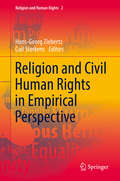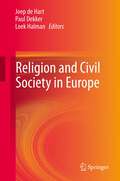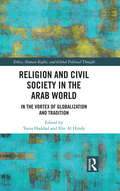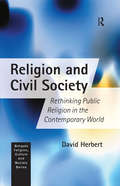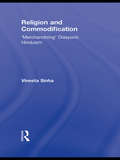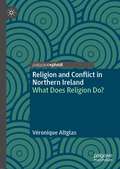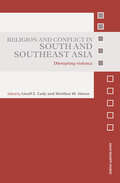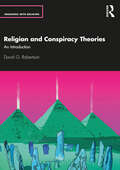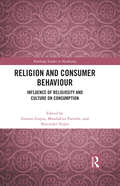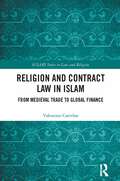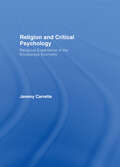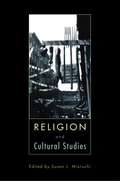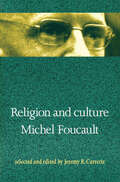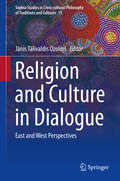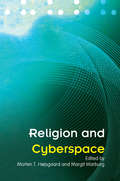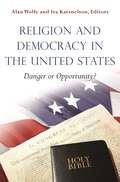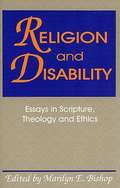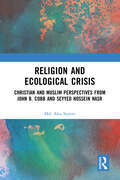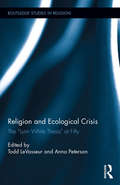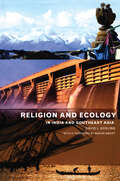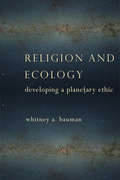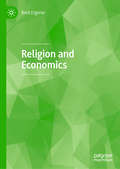- Table View
- List View
Religion and Civil Human Rights in Empirical Perspective
by Hans-Georg Ziebertz Carl SterkensThis volume offers an empirical perspective on the so-called first generation of human rights. It explores the legitimization of these human rights by individual people, both because of their religion and because of their vision of what constitutes human dignity. The book addresses such issues as the foundation of human rights, the necessity of a broader conversation about human rights, aspects of freedom of religion, and the role of religion in Belarus, Britain, Chile, Germany, Italy, Nigeria, Norway and Tanzania. Taking an international comparative perspective, the volume answers the question as to what extent adolescents in different countries support civil human rights and what influences their attitudes towards these rights. As the diversity of the contributions in this volume shows, the relationship between religion and civil human rights is complex and multifaceted. Studying this complicated relationship calls for a variety of theoretical perspectives and rigorous empirical testing in different national contexts. This book's empirical approach provides an important complementary perspective for legal, political and public debates.
Religion and Civil Society in Europe
by Paul Dekker Loek Halman Joep De HartReligion is back again in Europe after never having been gone. It is manifest in the revival of religious institutions and traditions in former communist countries, in political controversies about the relationship between the church(es) and the state and about the freedom of religion and the freedom to criticize religion, and in public unease about religious minorities. This book is about religion and civil society in Europe. It moves from general theoretical and normative approaches of this relationship, via the examination of national patterns of religion-state relations, to in-depth analyses of the impact of religion and secularization on the values, pro-social attitudes and civic engagement of individuals. It covers Europe from the Lutheran North to the Catholic South, and from the secularized West to the Orthodox East and Islamic South-East with comparative analyses and country studies, concluding with an overall Europe-USA comparison.
Religion and Civil Society in the Arab World: In the Vortex of Globalization and Tradition (Ethics, Human Rights and Global Political Thought)
by Tania Haddad Elie Al HindyThis book examines the links between civil society, religion and politics in the Middle East and North Africa region. The chapters in the volume explore the role of religion in shaping and changing the public sphere in regions that are developing and/or in conflict. They also discuss how these relations are reflected on civil society organizations and the role they are expected to play in transitional periods. This volume: investigates the conceptual dilemmas regarding what is ‘civil society’ in the Arab world today examines the dynamic roles of civil society organizations and religion in the Middle East and North Africa explores the future of the Arab civil society post-‘Arab Spring’ events, and how the latter continues to reshape the demand for democracy in the region. A comprehensive study of how the Arab civil society has come into being and its changing roles, this eclectic work will be of interest to scholars and researchers of politics, especially political Islam, international relations, Middle East Studies, African Studies, sociology and social anthropology.
Religion and Civil Society: Rethinking Public Religion in the Contemporary World (Religion, Culture and Society Series)
by David HerbertThis book presents the first full-length study of the relationship between religion and the controversial concept of civil society. Across the world in the last two decades of the twentieth century religions re-entered public space as influential discursive and symbolic systems apparently beyond the control of either traditional religious authorising institutions or states. This differentiation of religion from traditional institutions and entry into secular public spheres carries both dangers and possible benefits for democracy. Offering a fresh interdisciplinary approach to understanding religion in contemporary societies, this book provides an invaluable resource for students and researchers in religious studies, sociology, politics and political philosophy, theology, international relations and legal studies. Part one presents a critical introduction to the interaction between religion, modernization and postmodernization in Western and non-Western settings (America, Europe, the Middle East and India), focussing on discourses of human rights, civil society and the public sphere, and the controversial question of their cross-cultural application. Part two examines religion and civil society through case studies of Egypt, Bosnia and Muslim minorities in Britain, and compares Poland as an example of a Christian majority society that has experienced the public reassertion of religion.
Religion and Cognition: A Reader (Critical Categories in the Study of Religion)
by D. Jason SloneThe cognitive science of religion examines the mental processes that govern religious belief and behaviour. It offers a fresh and exciting approach to the scientific study of religion. 'Religion and Cognition' brings together key essays which outline the theory and illustrate this with experimental case material. The central topics in this new critical field of research are all addressed: meta-theoretical arguments for cognitive explanations of religion; theoretical models of cognition employed in the cognitive science of religion; prominent cognitive theories of religion; methods used to gather data and test theories; and experimental findings by cognitive scientists of religion.
Religion and Commodification: 'Merchandizing' Diasporic Hinduism (Routledge Research in Religion, Media and Culture)
by Vineeta SinhaSustaining a Hindu universe at an everyday life level requires an extraordinary range of religious specialists and ritual paraphernalia. At the level of practice, devotional Hinduism is an embodied religion and grounded in a materiality, that makes the presence of specific physical objects (which when used in worship also carry immense ritual and symbolic load) an indispensable part of its religious practices. Traditionally, both services and objects required for worship were provided and produced by occupational communities. The almost sacred connection between caste groups and occupation/profession has been clearly severed in many diasporic locations, but importantly in India itself. As such, skills and expertise required for producing an array of physical objects in order to support Hindu worship have been taken over by clusters of individuals with no traditional, historical connection with caste-related knowledge. Both the transference and disconnect just noted have been crucial for the ultimate commodification of objects used in the act of Hindu worship, and the emergence of an analogous commercial industry as a result. These developments condense highly complex processes that need careful conceptual explication, a task that is exciting and carries enormous potential for theoretical reflections in key fields of study. Using the lens of ‘visuality’ and ‘materiality,’ Sinha offers insights into the everyday material religious lives of Hindus as they strive to sustain theistic, devotional Hinduism in diasporic locations--particularly Singapore, Malaysia, and Tamilnadu--where religious objects have become commodified.
Religion and Conflict Resolution: Christianity and South Africa's Truth and Reconciliation Commission
by Megan ShoreThis book examines the ambiguous role that Christianity played in South Africa's Truth and Reconciliation Commission (TRC). It has two objectives: to analyse the role Christianity played in the TRC and to highlight certain consequences that may be instructive to future international conflict resolution processes. Religion and conflict resolution is an area of significant importance. Ongoing conflicts involving Palestinians and Israelis, Muslims and Hindus, and even radical Islamic jihadists and Western countries have heightened the awareness of the potential power of religion to fuel conflict. Yet these religious traditions also promote peace and respect for others as key components in doing justice. Examining the potential role religion can play in generating peace and justice, specifically Christianity in South Africa's TRC, is of utmost importance as religiously inspired violence continues to occur. This book highlights the importance of accounting for religion in international conflict resolution.
Religion and Conflict in Northern Ireland: What Does Religion Do?
by Véronique AltglasNorthern Ireland presents a fundamental challenge for the sociology of religion – how do religious beliefs, attitudes and identities relate to practices, violence and conflict? In other words, what does religion do?These interrogations are at the core of this book. It is the first critical and comprehensive review of the ways in which the social sciences have interpreted religion’s significance in Northern Ireland. In particular, it examines the shortcomings of existing interpretations and, in turn, suggests alternative lines of thinking for more robust and compelling analyses of the role(s) religion might play in Northern Irish culture and politics.Through, and beyond, the case of Northern Ireland, the second objective of this book is to outline a critical agenda for the social study of religion, which has theoretical and methodological underpinnings. Finally, this work engages with epistemological issues which never have been addressed as such in the Northern Irish context: how do conflict settings affect the research undertaken on religion, when religion is an object of political and violent contentions? By analysing the scope for objective and critical thinking in such research context, this critical essay intends to contribute to a sociology of the sociology of religion.
Religion and Conflict in South and Southeast Asia: Disrupting Violence (Asian Security Studies)
by Linell E. Cady Sheldon W. SimonA major new contribution to comparative and multidisciplinary scholarship on the alignment of religion and violence in the contemporary world, with a special focus on South and Southeast Asia. Religion and Conflict in South and Southeast Asia shows how this region is the site of recent and emerging democracies, a high degree of religious pluralism, the largest Muslim populations in the world, and several well-organized terrorist groups, making understanding of the dynamics of religious conflict and violence particularly urgent. By bringing scholars from religious studies, political science, sociology, anthropology and international relations into conversation with each other, this volume brings much needed attention to the role of religion in fostering violence in the region and addresses strategies for its containment or resolution. The dearth of other literature on the intersection of religion, politics and violence in contemporary South and Southeast Asia makes the timing of this book particularly relevant. This book will of great interest to advanced undergraduate and postgraduate students of Asian politics, security studies and conflict studies.
Religion and Conspiracy Theories: An Introduction (Engaging with Religion)
by David G. RobertsonReligion and Conspiracy Theories: An Introduction is the first accessible volume to systematically examine the relationship between religion and conspiracy theories in the contemporary world in critical and historical perspective.It lays out the historical development of these important categories, considers different theoretical approaches and looks at case studies of conspiracy theories in religion, about religion and as religion. It maintains a critical perspective throughout on the relationship between truth and power, and in the process provides a fresh perspective on belief and worldviews in our modern world.Designed for use in the classroom, the book features helpful diagrams and resources for teachers. It is an essential read for all students of religion and conspiracy theories, as well as scholars of politics, religious studies, sociology, anthropology and cultural studies.
Religion and Consumer Behaviour: Influence of Religiosity and Culture on Consumption (Routledge Studies in Marketing)
by Gaurav Gupta Shivinder Nijjer Mandakini ParuthiReligion is an important part of individual lives, playing a major role in our decision making and puchasing. Understanding the influence of religion on consumer behaviour is therefore an essential practice for business. The COVID-19 pandemic has especially enhanced the influence of consumers’ religiosity on their consumption decisions. This book concentrates on understanding the relationship of religiosity with various aspects of consumption and consumer behaviour to improve policy and build on an under represented topic. In this edited collection, expert contributors, academicians and researchers discuss the influence of religion on consumer behaviour in depth including the “dark side” of religion on consumers’ consumption behaviour and religious cults. The chapters also explore the ethical issues surrounding consumption and the role of religion on branding and sustainable practices. With a broad perspective, the book draws on examples of practices from Christianity, Islam, Hinduism and Buddhism. This book will be a particularly valuable resource for scholars and upper level students of marketing, consumer behaviour and consumer psychology. The interdisciplinary perspectives will also appeal to those studying sociology and globalization.
Religion and Contemporary Art: A Curious Accord
by Ronald R. BernierReligion and Contemporary Art sets the theoretical frameworks and interpretive strategies for exploring the re-emergence of religion in the making, exhibiting, and discussion of contemporary art. Featuring essays from both established and emerging scholars, critics, and artists, the book reflects on what might be termed an "accord" between contemporary art and religion. It explores the common strategies contemporary artists employ in the interface between religion and contemporary art practice. It also includes case studies to provide more in-depth treatments of specific artists grappling with themes such as ritual, abstraction, mythology, the body, popular culture, science, liturgy, and social justice, among other themes. It is a must-read resource for working artists, critics, and scholars in this field, and an invitation to new voices "curious" about its promises and possibilities.
Religion and Contract Law in Islam: From Medieval Trade to Global Finance (ICLARS Series on Law and Religion)
by Valentino CattelanWhat is a contract in Islam? Is it an aspect of Muslim religion or of secular life? How much has it changed over the centuries? Undertaking a search that spans revelation, legal tradition, and the reality of the Muslim world, this book explores the Islamic contract (‘aqd in Arabic) as a ‘city’ at the crossroads of convergent paths of translation, comparison, and law in context. In particular, the book shows that only by re-orienting traditional categories of Western law-religion toward the East can an alternative path of discovery for the ‘aqd be advanced. Hence, through a fortuitous encounter with an Arab Girl, the reader will (re-)visit the Temple of Western modernity and explore a city ruled by Towers of dialectical forces, carrying a hermeneutical Ring that combines dialectics, Islamic studies, and media theory. This interdisciplinary approach will not only enrich our knowledge of the ‘aqd but also make it more understandable as a cultural and social construction to which both Muslims and non-Muslims have participated in forging its multiple representations. By inviting the readers ‘to know who they are’ while looking at her, the Arab Girl is already waiting for us to listen to the Islamic contract in a new way. By applying a distinctive law and religion approach to the study of the contract in Islam, the book provides a comprehensive exploration of a topic that is of interest to legal and economic comparatists as well as to readers in anthropology, Islamic and cultural studies, and it is also of topical meaning for today’s international lawyers and the operators of an increasingly multicultural and transnational market.
Religion and Critical Psychology: Religious Experience in the Knowledge Economy
by Jeremy CarretteJeremy Carrette argues that the psychology of religion is no longer sustainable without a social critique, and that as William James predicted, the project of the modernist psychology of religion has failed. Controversially he champions greater social and philosophical analysis within the field to challenge the political naivety and disciplinary illusions of the traditional approaches to psychology of religion. Carrette discusses the relevance of the social and economic factors surrounding the debates of psychology and religion, through three critical examples: psychoanalysis humanistic psychology cognitive neuroscience. A Critical Psychology of Religion provides a new dimension to the debates surrounding religious experience. It will be of interest to students and researchers in the fields of critical psychology, religious experience and the psychology of religion and extends an interdisciplinary challenge to the separation of psychology, sociology, politics, economics and religion.
Religion and Cultural Studies
by Susan L. MizruchiAmericans have never been more religious than they are now, at the dawn of the twenty-first century. By all reports, attendance rates at traditional places of worship are high and rising; the influx of new immigrant religions has revitalized standard faiths and drawn in those who had strayed from them. Popular television shows like "The Simpsons" feature characters who go to church every Sunday and speak to God; special events, like the 1998 outdoor mass in Worcester, Massachusetts, for a comatose girl believed to have miraculous powers, attract thousands of people. This collection is both part of this ferment and an intellectual reflection upon it. Religion and Cultural Studies features essays by major scholars from the fields of anthropology, history, literary criticism, and religion in order to enrich critical discourse about religion and culture. Despite the variety of disciplines represented by this group of scholars and the variety of cultures explored in their essays--from fifteenth-century Flemish asceticism and nineteenth-century African-American spiritualism to Russian blood-libel trials and Alien Abduction Reports in the twentieth century--their common ground is the question of religion's place in current American academic analysis, and more broadly in American life today. The volume's range of vocabulary and subject matter is aimed at vitalizing scholarly interest in the field of religion and cultural studies and deepening intellectual inquiry in the contemporary academy. The contributors are Eytan Bercovitch, Karen McCarthy Brown, Gillian Feeley-Harnik, Richard Wightman Fox, Jenny Franchot, Giles Gunn, Geoffrey Galt Harpham, Bruce B. Lawrence, Jack Miles, Susan L. Mizruchi, and Jonathan Z. Smith.
Religion and Culture
by Michel FoucaultFirst Published in 1999. Routledge is an imprint of Taylor & Francis, an informa company.
Religion and Culture in Dialogue
by Jānis Tālivaldis OzoliņšThis volume addresses the issue of the human encounter with the Mystery of God and the purpose of human life. It explores major themes from diverse cultural and philosophical traditions, starting with questions about the possibility of belief in God, His transcendence as seen in both East and West, and ending with questions about ethics and about personhood, human dignity and human rights. Taking an eclectic approach, the chapters in this book each uniquely address aspects of the human encounter with the Mystery of God, drawing from specific cultures and traditions, and using a particular philosophical and theological style. Together, the chapters provide a fresh approach and a synergy that ensures that each topic contributes something new to the dialogue between religion and culture.
Religion and Cyberspace
by Margit Warburg Morten T. HøjsgaardIn the twenty-first century, religious life is increasingly moving from churches, mosques and temples onto the Internet. Today, anyone can go online and seek a new form of religious expression without ever encountering a physical place of worship, or an ordained teacher or priest. The digital age offers virtual worship, cyber-prayers and talk-boards for all of the major world faiths, as well as for pagan organisations and new religious movements. It also abounds with misinformation, religious bigotry and information terrorism. Scholars of religion need to understand the emerging forum that the web offers to religion, and the kinds of religious and social interaction that it enables.Religion and Cyberspace explores how religious individuals and groups are responding to the opportunities and challenges that cyberspace brings. It asks how religious experience is generated and enacted online, and how faith is shaped by factors such as limitless choice, lack of religious authority, and the conflict between recognised and non-recognised forms of worship. Combining case studies with the latest theory, its twelve chapters examine topics including the history of online worship, virtuality versus reality in cyberspace, religious conflict in digital contexts, and the construction of religious identity online. Focusing on key themes in this groundbreaking area, it is an ideal introduction to the fascinating questions that religion on the Internet presents.
Religion and Democracy in the United States: Danger or Opportunity?
by Alan Wolfe and Ira Katznelson EditorsThe United States remains a deeply religious country and religion plays an inextricably critical role in American politics. Controversy over issues such as abortion is fueled by opposition in the Catholic Church and among conservative Protestants, candidates for the presidency are questioned about their religious beliefs, and the separation of church and state remains hotly contested. While the examination of religion's influence in politics has long been neglected, in the last decade the subject has finally garnered the attention it deserves. In Religion and Democracy in the United States, prominent scholars consider the ways Americans understand the relationship between their religious beliefs and the political arena. This collection, a work of the Task Force on Religion and American Democracy of the American Political Science Association, thoughtfully explores the effects of religion on democracy and contemporary partisan politics. Topics include how religious diversity affects American democracy, how religion is implicated in America's partisan battles, and how religion affects ideas about race, ethnicity, and gender. Surveying what we currently know about religion and American politics, the essays introduce and delve into the range of current issues for both specialists and nonspecialists. In addition to the editors, the contributors are Allison Calhoun-Brown, Rosa DeLauro, Bette Novit Evans, James Gibson, John Green, Frederick Harris, Amaney Jamal, Geoffrey Layman, David Leal, David Leege, Nancy Rosenblum, Kenneth Wald, and Clyde Wilcox.
Religion and Disability: Perspectives in Scripture, Theology, and Ethics
by Marilyn E. BishopA collection of essays on disability and religion.
Religion and Ecological Crisis: Christian and Muslim Perspectives from John B. Cobb and Seyyed Hossein Nasr
by Md. Abu SayemReligion and Ecological Crisis delves into the complex relationship between religions and ecology, presenting Christian and Islamic perspectives on ecological issues through the work of John Boswell Cobb and Seyyed Hossein Nasr. It examines how faith traditions of the world see and respond to our current unprecedented climate change issues. This is the first comparative study of Cobb and Nasr’s eco-religious understanding, and explores how their prescriptions can contribute alternatively to techno-scientific initiatives in environmental sustainability. Taking Cobb’s "economism" and Nasr’s "scientism" as the key concepts for surveying the roots of the ecological crisis, the book offers interdisciplinary and interreligious insights into the debates about ecological equilibrium, motivational awareness in human mind and about entanglements between religion and the environment. This will be an insightful resource for policy makers, faith leaders and for academics working in Environmental Studies and Religious Studies.
Religion and Ecological Crisis: The “Lynn White Thesis” at Fifty (Routledge Studies in Religion)
by Todd LeVasseur Anna PetersonIn 1967, Lynn White, Jr.’s seminal article The Historical Roots of Our Ecologic Crisis was published, essentially establishing the academic study of religion and nature. White argues that religions—particularly Western Christianity—are a major cause of worldwide ecological crises. He then asserts that if we are to halt, let alone revert, anthropogenic damages to the environment, we need to radically transform religious cosmologies. White’s hugely influential thesis has been cited thousands of times in a variety of disciplines, including but not limited to religious studies, environmental ethics, history, ecological science, philosophy, psychology, and anthropology. In practical terms, the ecological crisis to which White was responding has only worsened in the decades since the article was published. This collection of original essays by leading scholars in a variety of interdisciplinary settings, including religion and nature, environmental ethics, animal studies, ecofeminism, restoration ecology, and ecotheology, considers the impact of White’s arguments, offering constructive criticism as well as reflections on the ongoing, ever-changing scholarly debate about the way religion and culture contribute to both environmental crises and to their possible solutions. Religion and Ecological Crisis addresses a wide range of topics related to White’s thesis, including its significance for environmental ethics and philosophy, the response from conservative Christians and evangelicals, its importance for Asian religious traditions, ecofeminist interpretations of the article, and which perspectives might have, ultimately, been left out of his analysis. This book is a timely reflection on the legacy and continuing challenge of White’s influential article.
Religion and Ecology in India and Southeast Asia
by David L GoslingWhat part can Hindu and Buddhist traditions play in resolving the ecological problems facing India and South East Asia? David Gosling's exciting study, based on extensive fieldwork, is of global significance: the creation of more sustainable relationships between people and the natural world is one of the most urgent social and environmental problems of the new millennium. David Gosling looks at the religions historically and from a contemporary perspective.
Religion and Ecology: Developing a Planetary Ethic
by Whitney BaumanMoving beyond identity politics while continuing to respect diverse entities and concerns, Whitney A. Bauman builds a planetary politics that better responds to the realities of a pluralistic world. Calling attention to the historical, political, and ecological influences shaping our understanding of nature, religion, humanity, and identity, Bauman collapses the boundaries separating male from female, biology from machine, human from more than human, and religion from science, encouraging readers to embrace hybridity and the inherent fluctuations of an open, evolving global community.As he outlines his planetary ethic, Bauman concurrently develops an environmental ethic of movement that relies not on place but on the daily connections we make across the planet. He shows how both identity politics and environmental ethics fail to realize planetary politics and action, limited as they are by foundational modes of thought that create entire worlds out of their own logic. Introducing a postfoundational vision not rooted in the formal principles of "nature" or "God" and not based in the idea of human exceptionalism, Bauman draws on cutting-edge insights from queer, poststructural, and deconstructive theory and makes a major contribution to the study of religion, science, politics, and ecology.
Religion and Economics
by Resit ErgenerThis book allows the reader to have an overview of the relations between religion and economics throughout history. It starts with the beginnings of early modern humans, when dreams (of dead ancestors), animism, synchronous movements and a propensity to exchange, led to the emergence of religion, which then contributed to the coordination and pooling of labor and to the definition of groups. This book surveys the various roles played by religion in economic life through the ages, which include the justification of the exploitation of nature, the expansion of trade, the emergence of inequality and of charity, the definition, enhancement and attenuation of hierarchies of dominance, the provision of various services and of the impact religion has had on economic performance at the micro and macro levels.
